Tuberculosis is a chronic infectious disease caused by Mycobacterium tuberculosis. It has been a major threat to public health. BCG (Bacillus Calmette–Guérin) is an attenuated M. bovis strain and the only licensed vaccine for tuberculosis.
Dr. FANG Min’s group at the Institute of Microbiology, Chinese Academy of Sciences (IMCAS), revealed the function and mechanism of NK cells in regulating T cell immunity and pulmonary pathology in a direct lung BCG infection mouse model.
Their results indicated that prolonged infection and pulmonary injury were observed after direct lung BCG infection in mice. Shortly after BCG infection, NK cells were activated and produced large amount of IFN-γ. In vivo depletion of NK cells by monoclonal antibody did not affect the bacterial load of BCG in the lung, while significantly ameliorated lung injury and markedly reduced the production of inflammatory cytokines and chemokines in the lung, suggesting that NK cells played a pathogenic role after BCG infection.
Moreover, NK cells postponed and inhibited the BCG-specific T cell immune responses. Secondary infection with avirulent Mtb strain H37Ra post BCG immunization showed that NK cells also inhibited secondary T cells immune responses.
Further investigations demonstrated that the surface expression of NKG2D ligands on alveolar macrophages was upregulated after being infected by BCG. NK cells lysed BCG-infected macrophages in an NKG2D dependent manner.
Therefore, the inhibition of T cell immunity by NK cells is likely mediated by killing of infected macrophages resulting in impaired antigen presentation.
This study furthers their understanding of the mechanisms for regulation of immune responses to tuberculosis, and may have important implications for the design of immune therapy to treat tuberculosis.
This work was supported by National Natural Science Foundation of China (Grant No. 31370877 and 31322020).
Article Link:https://www.ncbi.nlm.nih.gov/pubmed/29447423

Figure: NK cells aggravate inflammatory pathology and inhibte BCG-specific T cell immune responses after pulmonary BCG infection
Contact:
Dr. FANG Min
CAS Key Laboratory of Pathogenic Microbiology and Immunology,Institute Of Microbiology,Chinese Academy of Sciences,100101,Beijing, China
E-mail: fangm@im.ac.cn
